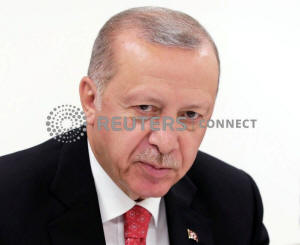|
Erdogan says no setback in missile deal
with Russia; as Trump voices sympathy
 Send a link to a friend
Send a link to a friend
 [June 29, 2019]
OSAKA (Reuters) - Turkey said
on Saturday there was no setback in its plan to buy Russian S-400
missile defence systems, despite U.S. opposition, and President Donald
Trump expressed understanding for the decision but did not rule out
sanctions in response. [June 29, 2019]
OSAKA (Reuters) - Turkey said
on Saturday there was no setback in its plan to buy Russian S-400
missile defence systems, despite U.S. opposition, and President Donald
Trump expressed understanding for the decision but did not rule out
sanctions in response.
NATO allies Turkey and the United States have been at odds over Turkey's
decision to procure the S-400s, with the United States warning of
sanctions if the deal goes through.
Turkey has dismissed the warnings and said it would not back down, as
already strained ties between the two countries have deteriorated
further over the dispute.
Speaking before talks with Russian President Vladimir Putin on the
sidelines of a G20 summit in Japan, Turkish President Tayyip Erdogan
said the deal for the S-400s showed improving ties between Turkey and
Russia.
"Now, I believe eyes are on the delivery process of this issue, but
there are no setbacks in our agreement," Erdogan said, adding that it
was a priority for Turkey that the deal includes joint production of the
systems and a technology transfer.

Erdogan also said it was important for Turkey to finish the first
reactor in the Akkuyu nuclear power plant, its first nuclear plant, by
2023. He said non-nuclear equipment at the plant should be procured from
Turkey.
The plant is being built by Russia's Rosatom at a cost of more than $20
billion.
Buying military equipment from Russia leaves Turkey vulnerable to U.S.
retribution under a 2017 law known as the Countering America's
Adversaries Through Sanctions Act (CAATSA).
The United States says the S-400s are not compatible with NATO's defence
network and could compromise its Lockheed Martin <LMT.N> F-35 stealth
fighter jets, an aircraft Turkey is helping to build and planning to
buy.
In an effort to sway Turkey, the United States has offered to supply it
with its Raytheon Co <RTN.N> Patriot missiles, but Erdogan has said the
U.S. offer was not as good as Russia's S-400 proposal.
Under the possible U.S. sanctions, Turkey could face expulsion from the
F-35 programme among other measures that could deal a significant blow
to Turkey's ailing economy and its defence industry sector.
Even minor U.S. sanctions could prompt another sharp sell-off in the
Turkish lira. A 30% slide in the currency drove the economy into
recession last year.
The lira has fallen another 10 percent this year, and markets remain on
edge.
'COMPLICATED'
Despite the threat of sanctions, Turkey has put its hopes in the
relationship between Erdogan and Trump, saying it expected the U.S.
president to protect it from sanctions over the S-400 deal.
[to top of second column]
|

Turkish President Recep Tayyip Erdogan attends a meeting with
Russian President Vladimir Putin on the sidelines of the G20 summit
in Osaka, Japan June 29, 2019. Sputnik/Mikhail Klimentyev/Kremlin
via REUTERS

Erdogan, in comments ahead of a meeting with Trump, said he believed
Turkey and the United States would act in line with their strategic
partnership.
Trump, sitting alongside Erdogan, said the United States faced a
"complicated" situation in how to respond to the S-400 deal, adding
that sanctions were being discussed.
But signalling a potential solution, Trump also expressed sympathy
with Erdogan, blaming former President Barack Obama's administration
for placing conditions on Turkey's purchase of Patriot missiles and
treating Turkey unfairly.
"We have a very complicated situation because the president was not
allowed to buy the Patriot missiles," Trump said.
"You can't do business that way. It's not good."
"They would not let him buy the missile that he wanted to buy, which
is the Patriot. He's a NATO member. He's somebody that I've become
friendly with. And you have to treat people fairly," he said.
"I don't think he was treated fairly."
Asked if the United States would impose sanctions on Turkey, Trump
said the issue was being discussed, but it was a "two-way street"
and both sides were evaluating "different solutions".
In a readout of the meeting, which lasted for about 40 minutes, the
White House said Trump "expressed concern" over the S-400 deal and
"encouraged Turkey to work with the United States on defence
cooperation in a way that strengthens the NATO alliance".
The S-400s are expected to be delivered in Turkey in the first half
of July. Turkish officials have said discussions on where the
systems would be stationed are underway.
(Reporting by Tuvan Gumrukcu in Ankara, Maria Vasilyeva in Moscow
and Roberta Rampton in Osaka; Additional reporting by Chang-Ran Kim;
Editing by Robert Birsel)
[© 2019 Thomson Reuters. All rights
reserved.]
Copyright 2019 Reuters. All rights reserved. This material may not be published,
broadcast, rewritten or redistributed.
Thompson Reuters is solely responsible for this content.
 |